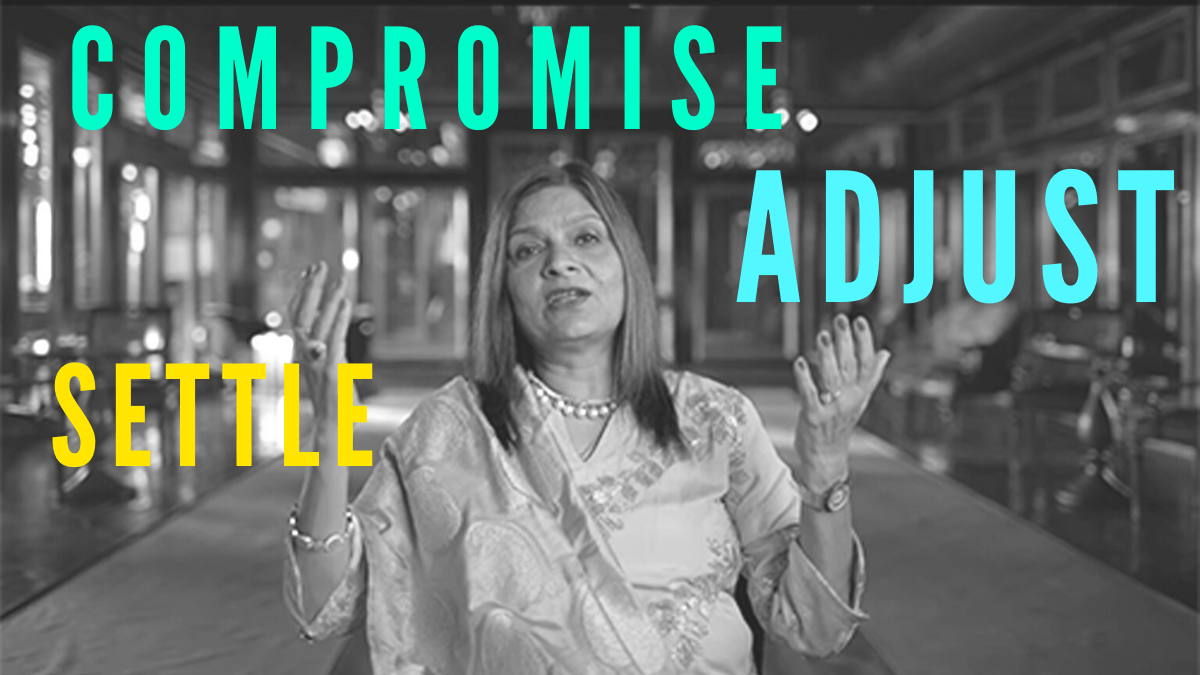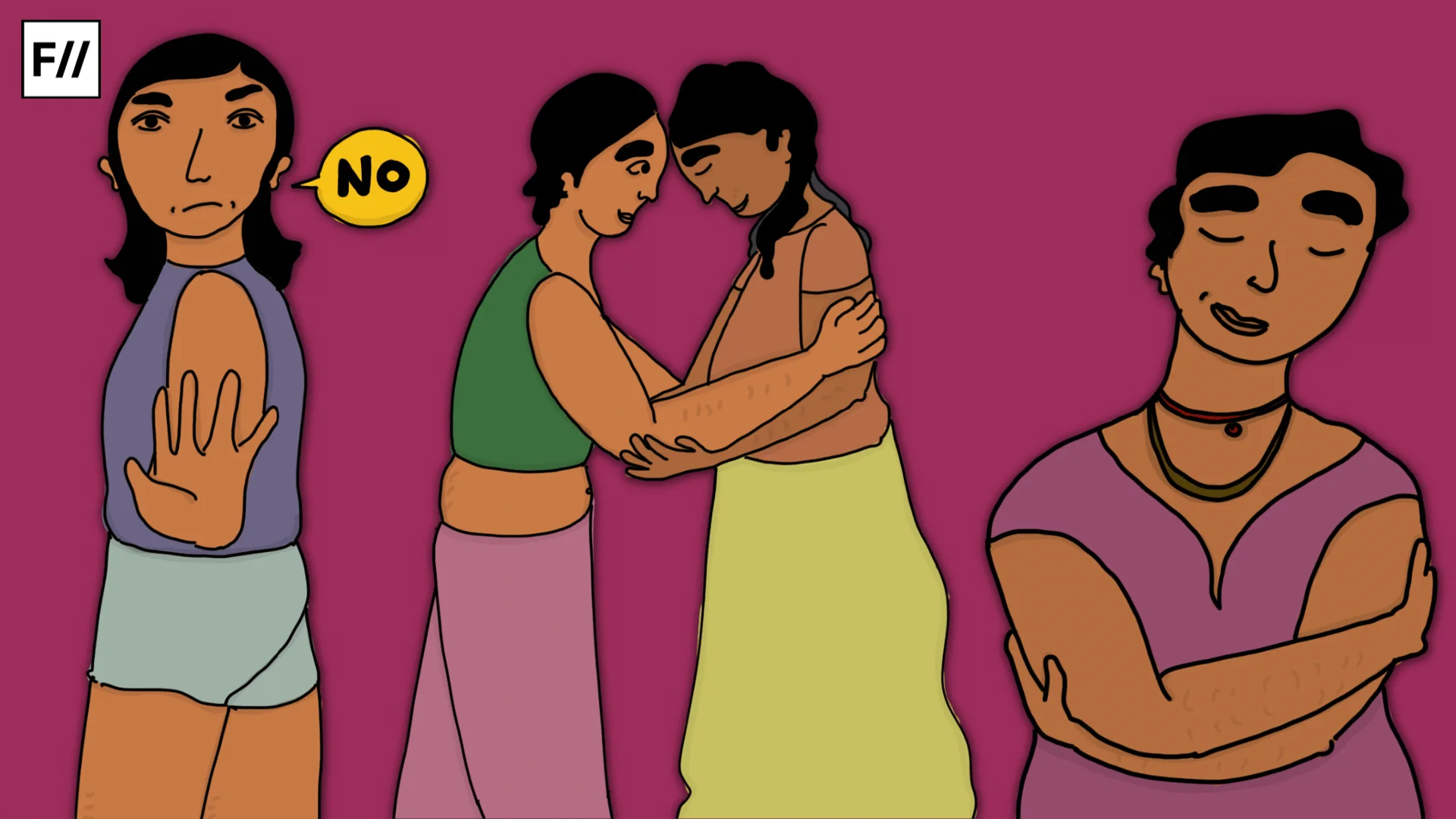Editor’s Note: This month, that is December 2020, FII’s #MoodOfTheMonth is Modern Love and Relationships, where we invite various articles to highlight how love has been fundamental in our lifeworlds and how these experiences and perceptions around love are shaped by our identities in a modern Indian context. If you’d like to share your article, email us at pragya@feminisminindia.com.
The current discourse of self love had pretty much heated up the romantic scenes in most upwardly mobile imageries of the quintessential way to life. Problem however arises time and again because there are no fixed methods to fall in love; be it with the self or the other. But there sure is a method for an invisible imposition; how to settle and its universal.
Compromise, through thick and thin, run the errands, walk the talk, keep the fly flying, but on whose expense?
Love is never equal. In capitalism, it is never about equity. Love hurts, it kills, it is oppressive. It is only now that the world historic defeat of a gender is daily negotiated vis a vis the institution of love, or politically understood as affect.
Love is never equal. In capitalism, love is never about equity. Love hurts, love kills, love is oppressive. It is only now that the world historic defeat of a gender is daily negotiated vis a vis the institution of love, or politically understood as affect.
My father hates my romantic records; on one hand, his feudal hangover makes him dislike all the men I have dated and on the other, every break up came as a daunting rejection of the absolute absence of the ‘feminine traits’ to ‘settle’, ‘bear’, ‘compromise’, ‘care’, ‘conform’, ritually, paternally reiterated during every episode of a heart break, dejection and trauma. The imposition of heteronormative monogamous casteist love sure has its effects on an upwardly mobile woman like me, who had been jolted in and out of love through paternal adjudication of an ‘ideal man’ and an ‘ideal relationship’.
I still haven’t quite grasped the image of both including my own image of how an independent heterosexual woman should be or what should be her stance regarding men and relationships. In relationships, especially those aimed at ‘settlements’, we voluntarily restrict our choices. At the end of the day, it is about making choices. And historically those choices are often being made on unequal terms, monopolistic tendencies and masculine patron client practices. 1000 reasons why Sima Aunty raged on Netflix were because we cringed on the aesthetically wrapped moments of severely restricted agency to choose or to reject. The women who did were tagged as too modern, self centred, rigid.
Also read: You Are My Soulmate Because Society Approves Us: Intersectionality In Love

Every single act of moving out of love or even failing at it was marked, recorded, evaluated with previous acts and that engendered a simmering dilemma in the mind of my father regarding his daughter’s ‘settlement plans’. Ironically, I still am not completely economically independent but I realised that the dilemma goes deeper. The dilemma to settle comes automatically warped in relationships of a woman’s late 20s because a). time is limited for her, and b) sexual control, because middle class nightmares often comes with the haunting of unregulated sexual adventures on the part of the woman.
The dilemma to settle comes automatically warped in relationships of a woman’s late 20s because a). time is limited for her, and b) sexual control, because middle class nightmares often comes with the haunting of unregulated sexual adventures on the part of the woman.
The latter is always the silent instigator to take the form of rebuke towards my callous deployment of ‘un-womanly attitudes’ to men and love. My mother on the other hand is much grounded about men since she often laments marriage in totality! Although not generalising, mothers often bear the brunt of negotiating with love, care and affect all alone, all within the marital arrangement and not surprisingly mine does it singly albeit in temporal burst of disgust and agony. Agony, that’s what love felt like mostly. Because no matter how hard one tried, one just could not afford to sabotage her own self to canon the relationship further.
Yes, women nowadays don’t conform unquestioningly. Middle class ideals are continually being deconstructed at the spheres of the bedroom to the corridors of the university and workspaces and men are also having to undo and unlearn the tropes of heterosexual love, sex and marriage. Fathers have to deal with sexually and emotionally liberated daughters because we took our lessons critically within patriarchy to check the latter, we have learnt to make use of our privileges to amplify voices of our own and others in need. And maybe we do it much more fearlessly (albeit at times in pain and vulnerability), nowadays that the ‘settlement plans’ often are met with halts and interruptions or complete disruptions.
Time is a valuable asset no doubt, but when it comes to women, it tends to become rigorously calculative. It becomes so objective that we at times end up internalising the fear of getting old and not finding love. It’s a process of negotiation that has no end because love’s association with patriarchal tropes goes way back in history and challenging the same, unpacking love is a tiring frustrating process. It is here that one interrogates love, through her lived experiences and often finds herself standing out of it but standing for it nevertheless.
From the self to the other, love is and was never really a personal choice.
Also read: Experiencing Love As An Aromantic Asexual (Aroace) Person
We struggle hard everyday to be loved and love and all those tropes of ‘free love’ doesn’t stand in capitalism. The more we consume love, the greater we subsume to it. Perhaps, what might lead us to a better place are our unwavering attempts to question, challenge, protest against everything that makes us less equal in this process of choosing and making those choices work. The dilemma to settle is here to stay. It might even conjure up the capacity to change how society imposes ‘settlement’ as an unnegotiable destiny, ensuing love.
About the author(s)
I am a student of sociology and gender studies. I did my masters in sociology at Delhi School of Economics. However my interest in gender studies had intrigued me to take up this course seriously. Currently I am enrolled for masters at Ambedkar University Delhi. My interest areas lie in researching on the epistemology of protest, nationalism, queerness , the sociology of the family, student politics, work, body and labour. I aspire to write more and bring my insights closer to activism. Intersectional understanding for me had helped me become a better political individual.




